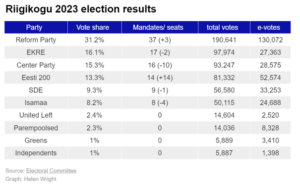Stefano Braghiroli (University of Tartu)
Sunday’s parliamentary elections in Estonia delivered a very positive result to the governing centre-right Reform party (31%) and a personal victory for Prime Minister Kaja Kallas. The strong popular support for Ms. Kallas’ leadership was confirmed by the record number of individual preferences received – the highest among any elected parliamentarian in modern Estonia. The liberal movement Estonia200 – winning seats in parliament for the first time – also performed well with 13% of the votes. Overall, the support for the progressive liberal Social Democratic party (currently junior partner in the ruling coalition) remained stable with 9% of the votes.
On the opposite side of the political spectrum, both the illiberal right-wing National Conservative Party of Estonia (EKRE) and the conservative Isamaa (Fatherland) appear to have suffered a limited decline in support, respectively with 16% and 8% of the votes. In turn, the centre-left socially-conservative Centre party witnessed a visible loss and obtained 15% of the votes (a loss of 8 percentage points, if compared to 2019). The electoral decline appears to be primarily a long-term consequence of the party’s past alliance with the far-right, during the second Ratas government (2019-21).

Source: ERR News
While on the eve of the elections, many concerned had discussed the concrete possibility of an EKRE-led government, which would have been the first far-right government in the country’s modern history, the electoral results instead seem to delineate a strong ‘liberal wave’. In the new parliament, Reform party, Estonia200, and Social-Democrats together control 60 of the available 101 seats, while the containment of illiberal forces appears clear, both electorally and in the parliament.
As was predictable, Russia’s aggression against Ukraine and its consequences have massively affected the electoral campaign and have dominated the parties’ programmes and electoral agendas. In the light of the out-going government’s very strong commitment to support Ukraine, with more than 1% of the country’s GDP spent in military support to Kyiv, Kallas’ message has been one of continuity and resilience. The direct and indirect socio-economic costs of the war and of supporting Ukraine’s struggle have been consistently framed in terms of national security. Such shared sense of responsibility is well summarized by the Reform party’s electoral slogan “Estonia in safe Hands.”

Electoral slogan of the Reform party – “Estonia in safe Hands”; Source: www.reform.ee
Overall, the decisive European and transatlantic line of the government in support of Ukraine has been embraced almost unanimously by both opposition and governing parties, also in the light of the very strong popular support for Kyiv’s cause. The government’s stance has been very much strengthened and amplified by Ms. Kallas’ solid sense of leadership and by her global visibility. Her increasingly strong voice both in EU and transatlantic circles has gained her the title of Europe’s ‘new Iron Lady’. The growing centrality of Estonia’s message has been recently epitomized by the visit of EU Commission President Ursula von der Leyen and NATO Secretary General Jens Stoltenberg to Tallinn, on February 2023, on the occasion of the first anniversary of Russia’s full scale invasion, which coincides with the Estonia’s independence day.
While each party combined the support to Ukraine with its own specific socio-economic policy programme, ranging from Estonia200’s neo-liberal solutions to the progressive agenda of the Social-Democrats, EKRE has been the only force that openly challenged the pro-Kyiv consensus. This stance, well summarized by the party’s electoral motto “Let’s Save Estonia” – has taken two main trajectories. The first has been to directly connect Estonia’s rampant two-digit inflation to Tallinn’s support for Ukraine. The second has implied a growing antagonism towards the large number of Ukrainian war refugees in the country blamed both as an economic burden and as a vector of ‘slavification’ for Estonia. The party’s message appears increasingly comparable to the one of Orban’s Hungary, where the unconditional support for ‘peace’ takes precedence over Ukraine’s freedom. EKRE’s stances can also be seen as an attempt to expand the party’s support among Estonia’s Russophone minority – a trend already seen during the last local elections of October 2021.

Electoral slogan of EKRE – “Let’s Save Estonia”; Source: www.ekre.ee
The electoral potential of EKRE’s appeal appears to have been undermined not only by Kallas’ powerful voice and consistent message, but also by a number of factors that have progressively undermined the party’s credibility ranging from alleged ties with Russia’s Wagner mercenary group leader Yevgeny Prigozhin to open criticism of Estonia’s high command’s management of the country’s arsenal.
As this post is being written, coalition talks are ongoing for the formation of a new three-party government headed by Ms. Kallas, including Estonia200 and the Social-Democrats, along with the Reform party. If successfully finalized, the new governing coalition will mark a very strong continuity in terms of support for Ukraine and strong pro-European and transatlantic commitment. While taxation, state budget, and economic policies appear to be the most debated issues among the future partners, the position of the new government is likely to balance liberal fiscal and social policies with an innovation-oriented agenda. Strong emphasis will also be given to a progressive agenda in terms of green transition and expansion of individual rights (i.e. gender equality and LGBT-friendly policies). Given, Estonia’s tradition of ideologically diverse coalitions, the next Kallas government is likely to be the most politically homogeneous executive since the mid-1990s. While this is not necessarily a guarantee of longevity, it might favour higher consistency and coherence in terms of policy making.
If we zoom in on the electoral map of Estonia, while the success of Kallas’ Reform party appears to be a nation-wide phenomenon, the eastern border county of Ida Virumaa emerges as a clear outlier. The region is home to the largest Russian-speaking community in the country and registered the lowest voter turnout in the country. While the Centre party – traditionally popular among Russian-speakers – obtained a plurality of the votes in the region (26%), around 30% of the votes in constituency went to openly pro-Kremlin candidates or lists. Emblematic are the cases of Aivo Peterson, who was in Russian-occupied Donbas during the elections, and of Mihhail Stalnuhhin expelled from the Centre party after comparing the Estonian government to Nazis. The two candidates registered the highest number of personal preferences in the region.
While the exceptional case of Ida Virumaa can be, at least in part, addressed by means of smart social policies focussing on the evident socio-economic problems of the region, it is undeniable that the ongoing war in Ukraine has increasingly polarized an already ethnically divided context as epitomized by the recent dispute on the removal of Soviet-era monuments.
A last dimension to address, as we discuss the electoral trends in Estonia, is relevance of e-voting, as the Baltic country is the only nation in Europe that allows such possibility. While electronic voting has been available as a voting mode to Estonian citizens since 2005, for the first time – in this election – it has emerged as the most popular voting option. E-voting takes place the week of the elections and ends the day before the physical vote takes place. As e-voting has been traditionally preferred by the liberal voters and ostracized by illiberal parties (primarily, EKRE) as a potential instrument of control of the ‘deep state’, the results of the paper ballots differed substantially from the e-voting, with the former giving a clear lead to EKRE, putting the Centre party in second place and the Reform party in the third position. Following the announcement of the results by the electoral commission of Estonia, in a Trump-style move, the leadership of EKRE has denounced the e-voting as not credible and announced a court appeal to challenge the outcome of the elections. The appeal is neither likely to have any tangible effect on the counting nor to trigger the polarizing effect witnessed in the US, given the very high trust in state institutions among the Estonian population.
Stefano Braghiroli is Associate Professor European Studies at the Johan Skytte Institute of Political Studies of the University of Tartu.
Photo Credits: Reformierakond
The views expressed in this blog reflect the position of the author and not necessarily that of the Brexit Institute Blog.



